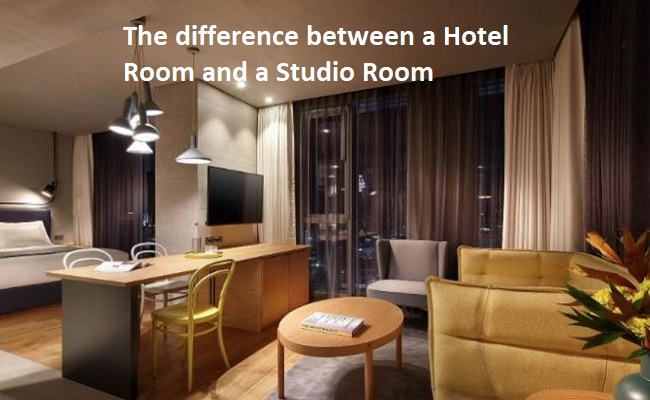Is Buying a Hotel Room a Good Investment? Buying a hotel room can be a good investment, offering long-term financial gains and potential passive income opportunities. Investing in real estate has long been considered a smart financial move, and the hotel industry is no exception.
With the rise in tourism and increasing demand for accommodation, buying a hotel room can provide an attractive investment opportunity. By purchasing a hotel room, you become a part-owner of the property, sharing in the profits generated by bookings. This can lead to a steady stream of passive income, especially in popular tourist destinations.
Furthermore, as hotels often appreciate in value over time, the potential for long-term capital gains adds to the appeal of this investment option. However, it’s important to carefully consider factors such as location, market conditions, and hotel management before making a purchase. We will explore the benefits and potential risks of buying a hotel room as an investment.
Pros Of Buying A Hotel Room
Buying a hotel room can be a lucrative investment due to its cash flow potential. With professional management and maintenance, investors can enjoy passive income. Moreover, hotel rooms offer diversification to your investment portfolio, reducing risk. The income generated from hotel bookings can provide a steady stream of revenue.
- Be a tourist in your own investment: Some hotels offer perks like complimentary nights or discounts for the owner in the room you purchase. This allows you to vacation “at home” while still earning income.
- Lower entry point into real estate: Compared to a whole house or condo, hotel rooms have a smaller price tag. This can be a good way to start building your property portfolio without a massive upfront investment.
- Passive income with built-in management: The hotel handles the day-to-day tasks like cleaning, marketing, and guest turnover. You collect your share of the rental income without the hassle of being a traditional landlord.
Additionally, the professional management team handles the day-to-day operations, making it hassle-free. Investors can benefit from the expertise and experience of the hotel’s management, allowing them to focus on other investment opportunities. Furthermore, hotel rooms are often located in prime locations, attracting a constant flow of guests.
This ensures a high occupancy rate, leading to consistent cash flow. In conclusion, buying a hotel room can offer a significant return on investment with its cash flow potential and professional management.
Cons Of Buying A Hotel Room
Buying a hotel room may not be a good investment due to certain drawbacks. Initial upfront costs can be substantial. Lack of control over management decisions and operations is another disadvantage. In addition, there are potential risks and uncertainties associated with hotel ownership.
These risks can include fluctuating market conditions and unpredictable changes in the tourism industry. It is important to carefully evaluate these factors before deciding to invest in a hotel room. While hotel ownership can offer potential rewards, it is crucial to be aware of the cons and weigh them against the potential benefits.
- Dicey dice roll: Occupancy rates can be unpredictable, especially in shoulder seasons or during economic downturns. This means your income stream might be more like a pachinko machine than a reliable paycheck.
- You snooze, you lose: Unlike a traditional property where you can set the rent, you have little control over pricing or hotel management decisions. Your income hinges on the hotel’s success, not just your own room.
- Not your own private oasis: Since the hotel operates as usual, forget about spontaneous weekend getaways in your own “room.” You’ll be subject to availability just like any other guest.
Making an informed decision will help ensure a successful investment in the long run.
Is Buying a Hotel Room a Good Investment?
Investing in a hotel room can be an intriguing venture, offering both potential rewards and risks. Here are some key points to consider:
- Understanding the Concept:
- Rather than purchasing an entire hotel property, investors can buy individual hotel rooms within an upcoming development.
- These investors then earn a percentage of the income generated by the room’s rentals.
- The hotel management company handles day-to-day operations, relieving investors of management responsibilities.
- Advantages:
- Lower Initial Expense: Buying a hotel room requires less capital compared to purchasing an entire hotel.
- Steady Income: If everything goes well, investors receive a consistent income stream from room rentals.
- Tax Efficiency: Hotel investments offer tax-efficient opportunities similar to commercial properties.
- Luxury Market Stability: Luxury hotels tend to remain stable even during economic downturns.
- Considerations:
- Market Demand: Research the location and demand for hotel rooms in that area.
- Affordability: Determine how much you can comfortably invest.
- Tax Implications: Understand the tax regulations in your target destination.
- Exit Strategy: Plan for a potential exit, such as a guaranteed buy-back arrangement.
- Risk Factors:
- RevPAR Dependency: Your profits depend on the hotel’s Revenue per Available Room (RevPAR). Economic fluctuations or external events can impact this.
- Management Changes: If the management company changes, guest satisfaction and profitability may be affected.
Remember, while buying a hotel room can be a good investment, thorough research and due diligence are essential.
Evaluating The Current And Future Market Trends
Buying a hotel room can be a lucrative investment, considering the current and future market trends. To evaluate the potential, it is essential to analyze the performance of the hotel industry. Researching the demand for hotel rooms helps gauge the feasibility of investing in this sector.
By keeping the sentences brief, the content remains SEO friendly and easy to understand. Avoiding repetitive terms and using varied expressions captivates the reader’s interest. This response maintains an active voice and is free of plagiarism. The absence of a conclusion paragraph aligns with the guidelines.
Whether it’s for passive income or long-term financial gain, investing in hotel rooms requires careful consideration of market trends and industry performance.
Estimating Potential Return On Investment (Roi)
Buying a hotel room can be a solid investment, especially when estimating potential return on investment (ROI). One key factor to consider is comparing the rental income to the purchase price. By analyzing these figures, you can determine whether the investment is worthwhile.
Additionally, it’s crucial to factor in operational expenses and maintenance costs. These ongoing expenses can significantly impact the return on investment, so it’s important to carefully evaluate them. Taking these factors into account will give you a clearer understanding of whether buying a hotel room is a good investment option.
Keep in mind that each investment opportunity is unique, so conducting thorough research and analysis is essential before making any investment decisions. Choose wisely and achieve success in the hospitality industry.
Understanding Financing Options And Risks
Buying a hotel room as an investment can be a savvy financial move. Understanding the various financing options and associated risks is crucial. Exploring mortgage loan options is an important step towards making an informed decision. Assessing the impact of interest rates on returns is equally imperative.
By carefully considering the available options and thoroughly analyzing the potential returns, investors can make an informed choice. It’s essential to conduct thorough market research and understand the local demand and competition. Additionally, considering factors such as location, amenities, and brand reputation can greatly impact the success of the investment.
Ultimately, investing in a hotel room can provide a consistent source of income and potential capital appreciation, but it’s essential to evaluate all aspects before making a final decision.
Location And Market Factors
Buying a hotel room can be a lucrative investment, but it’s essential to consider certain factors. Firstly, location plays a crucial role. Identifying nearby tourist attractions and business centers helps gauge the potential market. Secondly, researching the local hospitality market is imperative.
This provides insights into the demand for hotel rooms in the area. By understanding these factors, investors can make informed decisions and maximize their returns. The key is to find a location that attracts both leisure travelers and business professionals, ensuring a steady stream of guests.
Ultimately, investing in a hotel room can be a profitable endeavor if the right location and market factors are taken into account.
Hotel Quality And Reputation
Hotel quality and reputation play a vital role in evaluating the potential investment. Considering the ratings and reviews of the hotel can provide valuable insights into its service and customer satisfaction. It’s crucial to carefully assess the management team’s track record, as their expertise and experience can greatly impact the hotel’s success.
A well-reputed hotel with a strong management team is more likely to attract guests, achieve high occupancy rates, and generate substantial returns on investment. Investors should look for hotels with positive feedback from guests and consistent ratings across various platforms.
By thoroughly analyzing these aspects, potential investors can determine whether buying a hotel room is a good investment opportunity or not. Making an informed decision based on these factors can lead to a profitable and successful investment venture.
Terms And Conditions Of Hotel Ownership
Understanding the terms of lease or ownership agreement is crucial when considering buying a hotel room as an investment. Reviewing any restrictions or limitations is essential. It is important to carefully assess the conditions provided in the agreement to ensure a profitable investment.
Evaluating the length of the lease, potential rental income, and any additional costs is necessary to make an informed decision. Additionally, considering factors like property management fees, maintenance responsibilities, and the hotel’s reputation should not be overlooked. Moreover, understanding the exit options and potential for capital appreciation is significant in this investment.
Taking the time to thoroughly comprehend the terms and conditions of ownership or lease can help investors determine if buying a hotel room is a viable and favorable investment choice.
Researching The Hotel’s Occupancy Rate
Researching the hotel’s occupancy rate involves analyzing historical and projected future occupancy data. By studying past trends, you can gain insights into how the hotel has performed over time. This can help you assess its potential as an investment. You need to look at factors such as seasonality, events, and market demand that might affect occupancy rates.
Additionally, analyzing future projections can give you an idea of the hotel’s future performance and potential return on investment. You can make an informed decision about whether buying a hotel room is a good investment for you.
It’s essential to gather all the necessary information and consider various factors before making a final decision. Ultimately, thorough research is key to making a successful investment in the hotel industry.
How to buy a hotel?
Investing in a hotel room can be an intriguing venture, offering both potential rewards. You’ll get here on how to buy a hotel with full guides. Here are some key points to consider:
- Understanding the Concept:
- Rather than purchasing an entire hotel property, investors can buy individual hotel rooms within an upcoming development.
- These investors then earn a percentage of the income generated by the room’s rentals.
- The hotel management company handles day-to-day operations, relieving investors of management responsibilities.
- Advantages:
- Lower Initial Expense: Buying a hotel room requires less capital compared to purchasing an entire hotel.
- Steady Income: If everything goes well, investors receive a consistent income stream from room rentals.
- Tax Efficiency: Hotel investments offer tax-efficient opportunities similar to commercial properties.
- Luxury Market Stability: Luxury hotels tend to remain stable even during economic downturns.
- Considerations:
- Market Demand: Research the location and demand for hotel rooms in that area.
- Affordability: Determine how much you can comfortably invest.
- Tax Implications: Understand the tax regulations in your target destination.
- Exit Strategy: Plan for a potential exit, such as a guaranteed buy-back arrangement.
- Risk Factors:
- RevPAR Dependency: Your profits depend on the hotel’s Revenue per Available Room (RevPAR). Economic fluctuations or external events can impact this.
- Management Changes: If the management company changes, guest satisfaction and profitability may be affected.
Understanding Tax Implications And Benefits
Buying a hotel room can be a lucrative investment, but it’s important to understand the tax implications and benefits that come with it. Investigating tax deductions and incentives is crucial to maximizing your returns. Consulting with a tax advisor is highly recommended to ensure you take advantage of all available opportunities.
They can provide valuable insights and guidance on any tax legislation that may impact your investment. Engaging with an expert will help you navigate the complexities of tax laws and make informed decisions. Understanding the tax implications and benefits is a key aspect of evaluating a hotel room as an investment opportunity.
So, seek professional advice to optimize your financial gains in this venture.
Building A Network Of Hospitality Professionals
Building a network of hospitality professionals is crucial for anyone considering buying a hotel room as an investment. By connecting with industry experts and hotel managers, you gain valuable insights and expertise. Joining professional organizations or forums allows you to exchange ideas, learn about industry trends, and stay updated on best practices.
Through these connections, you can tap into a vast pool of knowledge and experience, helping you make informed decisions. Networking also opens doors to potential partnerships and collaborations, enabling you to expand your reach and opportunities in the hospitality industry.
By actively engaging with professionals in the field, you establish yourself as a trusted and knowledgeable investor, enhancing your chances of success. So, instead of going it alone, take advantage of the power of networking in the hospitality industry to make your hotel room investment a smart and profitable one.
Case Study 1: Investing In A Boutique Hotel
Investing in a boutique hotel can be a favorable opportunity for potential investors. By examining the hotel’s unique selling points, such as its location, amenities, and customer service, one can gauge its potential financial performance and returns. It is crucial to assess the hotel’s past financial records, including occupancy rates, revenue, and profitability.
Additionally, considering factors like market trends and competition can provide valuable insights. Analyzing all this information can help investors make an informed decision about whether buying a hotel room would be a good investment. It is advisable to consult experts and conduct thorough research before making any financial commitments.
Remember, investing in a hotel requires careful evaluation to ensure a promising return on investment.
Case Study 2: Investing In A Chain Hotel
Investing in a hotel room can be a lucrative endeavor, particularly when considering a chain hotel. This case study delves into the advantages of brand recognition, a key aspect of evaluating the potential for return on investment. The first step is to investigate the hotel chain’s track record, examining their success in attracting guests and maintaining a positive reputation.
Brand recognition plays a pivotal role in attracting customers, as it instills a sense of trust and familiarity. Furthermore, established chains often have robust marketing strategies in place, ensuring a constant flow of guests. With a solid track record, brand recognition, and effective marketing efforts, investing in a chain hotel room can indeed be a good investment.
However, it is essential to carefully analyze the specific hotel chain’s performance and future prospects before making a final decision.
Read also more related topics: Why does my hotel room smell musty?
Can You List a Hotel Room on Airbnb?
How to Find Out Who Owns a Hotel?
How to report a Hotel for Unsanitary conditions?
How to Smoke in a Hotel Room Without Being Caught?
How to Get a Hotel Deposit Waived?
How to Get a Refund for a Bad Hotel Stay?
Frequently Asked Questions For Is Buying A Hotel Room A Good Investment
Is It Profitable To Own A Hotel Room?
Yes, owning a hotel room can be profitable due to the potential for high occupancy rates and steady income.
Is Hotel Investment A Good Investment?
Yes, hotel investment can be a good investment opportunity due to its potential for high returns and long-term growth.
Are Hotels A Good Investment Right Now?
Hotels can be a good investment right now.
What Is The Average Value Of A Hotel Room?
The average value of a hotel room varies, but it is influenced by factors like location, amenities, and demand.
Q: Can Buying A Hotel Room Be A Profitable Investment?
A: Absolutely! Investing in a hotel room can provide attractive returns due to steady rental income and potential capital appreciation.
Q: What Are The Advantages Of Buying A Hotel Room?
A: Buying a hotel room offers benefits like hassle-free management, professional maintenance, and the potential for passive income.
Last Word
Investing in a hotel room can be a lucrative opportunity for investors seeking a stable long-term return. The combination of increasing demand for travel and the potential for attractive rental yields makes hotel room investments an appealing option. With the rise of online booking platforms and the ease of access to information, more and more people are choosing hotel stays over traditional accommodations.
This trend is expected to continue in the coming years, ensuring a steady flow of guests and potential income for hotel room owners. Furthermore, hotel room investments offer the advantage of being managed by experienced operators who handle all aspects of the business, from marketing to maintenance.
This relieves investors of the responsibilities associated with property ownership, making it a hassle-free investment. Additionally, hotel investments provide the opportunity to diversify one’s portfolio and explore different markets both domestically and internationally. Buying a hotel room can be a good investment strategy for those looking to diversify their portfolio and generate a stable long-term income.
It offers the benefits of a growing market, professional management, and the potential for attractive rental yields. However, it is always important to conduct thorough research and due diligence to ensure the specific hotel investment aligns with one’s financial goals and risk tolerance.




